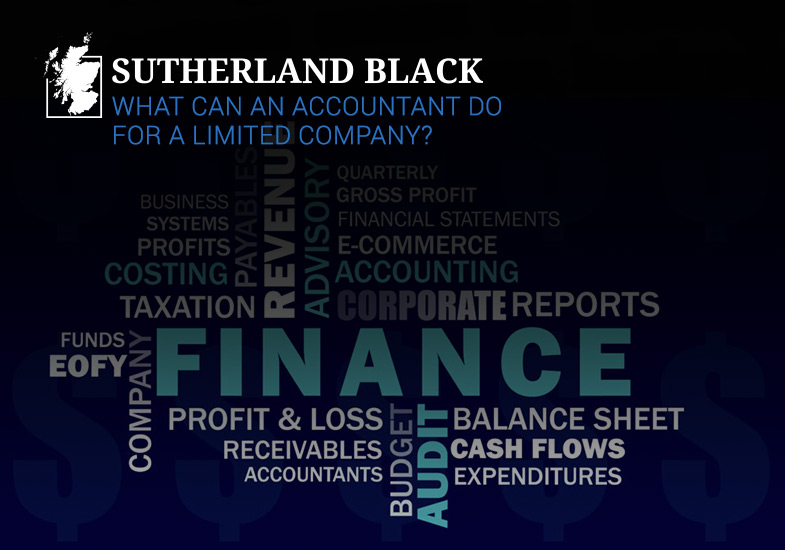We have come across quite a few people over the last 15 years attempt to do their limited company accounting themselves to save a small amount of money on accountancy fees. While it may be sensible if you are a sole trader to learn how to do bookkeeping and file your tax returns, trying to master company accounts and tax without the help of a professional can be a false economy.
Top 7 things an accountant can do for your limited company
Filing company accounts and taxes without specialised software is nearly impossible these days. Companies House and HMRC expect company annual accounts and corporation tax returns respectively to be filed in a unique electronic format. A good accountant will make short work of these filings and provide many other accountancy services like bookkeeping, VAT, payroll, cis, and much more.
However, probably the most compelling reason to get an excellent limited company accountant on board is so that you have a trusted advisor on the end of the phone for all your business and tax queries and advice.
Read on to see how a great accountant can help your company run smoothly and how to choose an accountant that is good for you.
1. Company accounts and corporation tax
The primary annual filings that a limited company needs to do are the yearly company accounts to companies house and the corporation tax return to HMRC. While these may seem pretty straightforward tasks, these are both complex documents that need to be submitted correctly to avoid penalties. Some years ago, HMRC and companies house demanded that all submissions are electronic and the accounts are submitted in an obscure machine-readable format called IXBRL.
The requirement for IXBRL accounts effectively means that companies must prepare limited company accounts in specialist accounting software. Some cloud accounting software packages now allow company accounts and corporation tax returns to be submitted straight from the software.
However, this facility does not replace the specialist accounting knowledge required to ensure all the accounting policies are correct and all the sections of the company tax return are filled in correctly. It is also essential that the balance sheet is checked to show an accurate representation of the value of the limited company. Trading in an insolvent position can lead to penalties for the directors.
2. Confirmation statement and other Companies House filings
Along with the annual accounts and corporation tax return, other Companies House filings are mandatory. A confirmation statement is needed once a year to confirm the standing data of the limited company. The company also needs to keep the information at companies house about their ultimate beneficial owners up to date. These details are usually held at companies house and can be updated with the “Person of Significant Control” (PSC) forms.
If the limited company changes its year-end, share structure, registered office, or any other significant change, these must be notified to companies house as well. Again these filings are far more straightforward with specialised software than trying to do them individually by hand.
3. Tax advice
One of the significant advantages of running your business as a limited company is that it can be very tax efficient. A good tax accountant can ensure that your limited company is structured correctly and that your company tax bill is as low as possible. The accountant can submit both your company tax return and the personal tax returns for the company directors. The advantage of having the accountant act for your limited company and the directors and shareholders is that the company tax and personal tax interact.
Salary, dividends, pension contributions, corporation tax, and personal tax are all interlinked. Only someone with an overview can choose the optimum combination and give you peace of mind that you are only paying the tax that you need to be.
An excellent limited company accountant can probably save you more tax than they charge you in fees if you haven’t set your company up for tax efficiency in the first place. We have had cases where we have saved clients tens of thousands of pounds a year by restructuring their remuneration. These potential savings can be a considerable multiple of the annual fee for our services. We build in tax efficiency checks for every client.
4. Cloud Accounting Bookkeeping Services
Nearly everyone who runs a limited company these days uses online accounting software to run their bookkeeping for their business. The market leader is Xero which has over 2 million customers worldwide. Xero software allows you to run your business entirely in the cloud and customise the system through integrations to suit your business niche. The software can interface with your bank account to pull the transactions automatically and speed up the processing of your business income and expenses.
A good limited company accountant will help you set up a system to streamline your business and make sure that you have accurate and up-to-date financial information at all times to assist you with business decisions. If you do not wish to run the system yourself, the accountant will be able to do all the record-keeping for you, right up to a fully outsourced finance function.
5. Business Advice and Management Accounts
Once a small business has an excellent online accounting system set up, the owner can use this system to provide exceptional management information at whichever frequency the company demands. Modern accounting software can give great insights into areas where the business can improve. Pricing, cash flow, and overheads are just some of the areas where excellent reporting and a good accountant can help a company improve its finances. Monthly or quarterly review meetings can identify areas of improvement and keep the business on track.
6. VAT Services
Even if you are happy running your bookkeeping yourself, it is wise to get an accountant to check your VAT returns for you or submit your VAT returns on your behalf. VAT is an extraordinarily complicated tax, and getting it wrong can lead to hefty fines from HMRC. Areas such as the construction reverse charge and importing and exporting are just some of the areas that need specialist expertise.
When you are initially starting a company and doing your vat registration, choosing the correct VAT scheme for your new business is essential. There are many different VAT schemes that can benefit different types of small companies.
7. Payroll, auto-enrolment, and CIS
We do have some clients that do their own payroll. However, the actual cost of having an accountant run your payroll is dwarfed by the potential costs of getting it wrong. The introduction of auto-enrolment pensions a few years ago adds another complication which means having a qualified individual to process the wages is even more critical.
The Construction Industry Scheme (CIS) is another area full of risks for small businesses. It is a complex area, and mistakes can be costly. A professional payroll function will run this in conjunction with the rest of the payroll and ensure that the correct filings and payments to HMRC are made.
How to choose an accountant that suits you
Regulation of accountants
When it comes to choosing an accountant, there are many things to consider. The first thing that people may find surprising is that the term “Accountant” has no particular meaning in the UK. Anyone can start a business and call themselves an accountant, unlike other professions such as a solicitor. This lack of protection means that when you choose an accountant, you should look for the type of firm regulated by an advisory body, or you will have no guarantee of their quality standards.
The gold standard of accountants is those who belong to one of the Chartered Institutes. The Chartered Institute in Scotland is The Institute of Chartered Accountants of Scotland (ICAS).
Types of accountant and obtaining loans
One advantage of using a Chartered Accountant is that when it comes to obtaining finance for your company or a personal mortgage, many lenders insist that a Chartered Accountant signs off the accounts. The lenders will usually have a list of institutions that are acceptable for the sign-off.
How accountants charge
Traditionally accountants charged by the hour. This charging method was excellent for the accountants and not so great for the clients. If the accountant put their slowest person on a job, then the fee would be more. “Surprise bills” were often the biggest complaint about accountants from their clients. These days, most forward-thinking accountants will agree to a fixed fee for their contracted work. The client can pay a reasonable monthly fee in the knowledge that they won’t get a surprise bill at the end of the year.
A trusted advisor
As we mentioned in the introduction, one of the main advantages of having a great accountancy firm onboard for your business is having someone to call if your business has problems. The last couple of years have been a great example of this. We have helped clients get through the Covid pandemic with advice on grants, loans, the furlough scheme, and keeping their cash flow positive until their business picks up again.
We have also been on hand to help businesses through tax enquiries, bereavements of critical participants, and restructuring or the sale of the business as the business matures.
Contact us about your limited company accountancy
Running a limited company is a complex challenge. In our experience, small business owners who concentrate on sales and marketing and deliver excellent service have the most successful businesses. It is far more efficient to employ a great accountant to look after the accounting and tax responsibilities than try to learn how to do these things yourself.
If you would like us to give you a quote for providing anything from the minimum to a full range of accountancy services, please do not hesitate to get in contact with us. We can quote you for just your company accounts and corporation tax right or include bookkeeping, vat, payroll, and more.
We offer a free initial meeting and can immediately start giving you some advice on making your business run more smoothly and more tax efficient.
First time here?
You might also be interested in the following related and popular articles:





